- Home
- Joseph Conrad
Tales of Unrest Page 2
Tales of Unrest Read online
Page 2
KARAIN, A MEMORY
I
We knew him in those unprotected days when we were content to hold inour hands our lives and our property. None of us, I believe, has anyproperty now, and I hear that many, negligently, have lost their lives;but I am sure that the few who survive are not yet so dim-eyed as tomiss in the befogged respectability of their newspapers the intelligenceof various native risings in the Eastern Archipelago. Sunshine gleamsbetween the lines of those short paragraphs--sunshine and the glitter ofthe sea. A strange name wakes up memories; the printed words scent thesmoky atmosphere of to-day faintly, with the subtle and penetratingperfume as of land breezes breathing through the starlight of bygonenights; a signal fire gleams like a jewel on the high brow of a sombrecliff; great trees, the advanced sentries of immense forests, standwatchful and still over sleeping stretches of open water; a line ofwhite surf thunders on an empty beach, the shallow water foams on thereefs; and green islets scattered through the calm of noonday lie uponthe level of a polished sea, like a handful of emeralds on a buckler ofsteel.
There are faces too--faces dark, truculent, and smiling; the frankaudacious faces of men barefooted, well armed and noiseless. Theythronged the narrow length of our schooner's decks with their ornamentedand barbarous crowd, with the variegated colours of checkered sarongs,red turbans, white jackets, embroideries; with the gleam of scabbards,gold rings, charms, armlets, lance blades, and jewelled handles of theirweapons. They had an independent bearing, resolute eyes, a restrainedmanner; and we seem yet to hear their soft voices speaking of battles,travels, and escapes; boasting with composure, joking quietly; sometimesin well-bred murmurs extolling their own valour, our generosity;or celebrating with loyal enthusiasm the virtues of their ruler. Weremember the faces, the eyes, the voices, we see again the gleam of silkand metal; the murmuring stir of that crowd, brilliant, festive, andmartial; and we seem to feel the touch of friendly brown hands that,after one short grasp, return to rest on a chased hilt. They wereKarain's people--a devoted following. Their movements hung on his lips;they read their thoughts in his eyes; he murmured to them nonchalantlyof life and death, and they accepted his words humbly, like gifts offate. They were all free men, and when speaking to him said, "Yourslave." On his passage voices died out as though he had walked guardedby silence; awed whispers followed him. They called him their war-chief.He was the ruler of three villages on a narrow plain; the master ofan insignificant foothold on the earth--of a conquered foothold that,shaped like a young moon, lay ignored between the hills and the sea.
From the deck of our schooner, anchored in the middle of the bay, heindicated by a theatrical sweep of his arm along the jagged outlineof the hills the whole of his domain; and the ample movement seemed todrive back its limits, augmenting it suddenly into something so immenseand vague that for a moment it appeared to be bounded only by the sky.And really, looking at that place, landlocked from the sea and shut offfrom the land by the precipitous slopes of mountains, it was difficultto believe in the existence of any neighbourhood. It was still,complete, unknown, and full of a life that went on stealthily with atroubling effect of solitude; of a life that seemed unaccountably emptyof anything that would stir the thought, touch the heart, give a hint ofthe ominous sequence of days. It appeared to us a land without memories,regrets, and hopes; a land where nothing could survive the coming of thenight, and where each sunrise, like a dazzling act of special creation,was disconnected from the eve and the morrow.
Karain swept his hand over it. "All mine!" He struck the deck with hislong staff; the gold head flashed like a falling star; very close behindhim a silent old fellow in a richly embroidered black jacket alone ofall the Malays around did not follow the masterful gesture with a look.He did not even lift his eyelids. He bowed his head behind his master,and without stirring held hilt up over his right shoulder a long bladein a silver scabbard. He was there on duty, but without curiosity, andseemed weary, not with age, but with the possession of a burdensomesecret of existence. Karain, heavy and proud, had a lofty pose andbreathed calmly. It was our first visit, and we looked about curiously.
The bay was like a bottomless pit of intense light. The circular sheetof water reflected a luminous sky, and the shores enclosing it made anopaque ring of earth floating in an emptiness of transparent blue. Thehills, purple and arid, stood out heavily on the sky: their summitsseemed to fade into a coloured tremble as of ascending vapour; theirsteep sides were streaked with the green of narrow ravines; at theirfoot lay rice-fields, plantain-patches, yellow sands. A torrent woundabout like a dropped thread. Clumps of fruit-trees marked the villages;slim palms put their nodding heads together above the low houses;dried palm-leaf roofs shone afar, like roofs of gold, behind the darkcolonnades of tree-trunks; figures passed vivid and vanishing; the smokeof fires stood upright above the masses of flowering bushes; bamboofences glittered, running away in broken lines between the fields. Asudden cry on the shore sounded plaintive in the distance, and ceasedabruptly, as if stifled in the downpour of sunshine. A puff of breezemade a flash of darkness on the smooth water, touched our faces, andbecame forgotten. Nothing moved. The sun blazed down into a shadowlesshollow of colours and stillness.
It was the stage where, dressed splendidly for his part, he strutted,incomparably dignified, made important by the power he had to awaken anabsurd expectation of something heroic going to take place--a burst ofaction or song--upon the vibrating tone of a wonderful sunshine. He wasornate and disturbing, for one could not imagine what depth of horriblevoid such an elaborate front could be worthy to hide. He was notmasked--there was too much life in him, and a mask is only a lifelessthing; but he presented himself essentially as an actor, as a humanbeing aggressively disguised. His smallest acts were prepared andunexpected, his speeches grave, his sentences ominous like hints andcomplicated like arabesques. He was treated with a solemn respectaccorded in the irreverent West only to the monarchs of the stage, andhe accepted the profound homage with a sustained dignity seen nowhereelse but behind the footlights and in the condensed falseness of somegrossly tragic situation. It was almost impossible to remember who hewas--only a petty chief of a conveniently isolated corner of Mindanao,where we could in comparative safety break the law against the trafficin firearms and ammunition with the natives. What would happen shouldone of the moribund Spanish gun-boats be suddenly galvanized into aflicker of active life did not trouble us, once we were inside thebay--so completely did it appear out of the reach of a meddling world;and besides, in those days we were imaginative enough to look witha kind of joyous equanimity on any chance there was of being quietlyhanged somewhere out of the way of diplomatic remonstrance. As toKarain, nothing could happen to him unless what happens to all--failureand death; but his quality was to appear clothed in the illusion ofunavoidable success. He seemed too effective, too necessary there, toomuch of an essential condition for the existence of his land and hispeople, to be destroyed by anything short of an earthquake. He summed uphis race, his country, the elemental force of ardent life, of tropicalnature. He had its luxuriant strength, its fascination; and, like it, hecarried the seed of peril within.
In many successive visits we came to know his stage well--the purplesemicircle of hills, the slim trees leaning over houses, the yellowsands, the streaming green of ravines. All that had the crude andblended colouring, the appropriateness almost excessive, the suspiciousimmobility of a painted scene; and it enclosed so perfectly theaccomplished acting of his amazing pretences that the rest of the worldseemed shut out forever from the gorgeous spectacle. There could benothing outside. It was as if the earth had gone on spinning, and hadleft that crumb of its surface alone in space. He appeared utterly cutoff from everything but the sunshine, and that even seemed to be madefor him alone. Once when asked what was on the other side of the hills,he said, with a meaning smile, "Friends and enemies--many enemies;else why should I buy your rifles and powder?" He was always likethis--word-perfect in his part, playing up faithfully to the mysteriesand ce
rtitudes of his surroundings. "Friends and enemies"--nothing else.It was impalpable and vast. The earth had indeed rolled away from underhis land, and he, with his handful of people, stood surrounded by asilent tumult as of contending shades. Certainly no sound came fromoutside. "Friends and enemies!" He might have added, "and memories," atleast as far as he himself was concerned; but he neglected to make thatpoint then. It made itself later on, though; but it was after thedaily performance--in the wings, so to speak, and with the lights out.Meantime he filled the stage with barbarous dignity. Some ten years agohe had led his people--a scratch lot of wandering Bugis--to the conquestof the bay, and now in his august care they had forgotten all the past,and had lost all concern for the future. He gave them wisdom, advice,reward, punishment, life or death, with the same serenity of attitudeand voice. He understood irrigation and the art of war--the qualities ofweapons and the craft of boat-building. He could conceal his heart; hadmore endurance; he could swim longer, and steer a canoe better than anyof his people; he could shoot straighter, and negotiate more tortuouslythan any man of his race I knew. He was an adventurer of the sea, anoutcast, a ruler--and my very good friend. I wish him a quick death in astand-up fight, a death in sunshine; for he had known remorse and power,and no man can demand more from life. Day after day he appeared beforeus, incomparably faithful to the illusions of the stage, and at sunsetthe night descended upon him quickly, like a falling curtain. The seamedhills became black shadows towering high upon a clear sky; above themthe glittering confusion of stars resembled a mad turmoil stilled by agesture; sounds ceased, men slept, forms vanished--and the realityof the universe alone remained--a marvellous thing of darkness andglimmers.
II
But it was at night that he talked openly, forgetting the exactions ofhis stage. In the daytime there were affairs to be discussed in state.There were at first between him and me his own splendour, my shabbysuspicions, and the scenic landscape that intruded upon the reality ofour lives by its motionless fantasy of outline and colour. His followersthronged round him; above his head the broad blades of their spears madea spiked halo of iron points, and they hedged him from humanity by theshimmer of silks, the gleam of weapons, the excited and respectful humof eager voices. Before sunset he would take leave with ceremony, and gooff sitting under a red umbrella, and escorted by a score of boats.All the paddles flashed and struck together with a mighty splash thatreverberated loudly in the monumental amphitheatre of hills. A broadstream of dazzling foam trailed behind the flotilla. The canoes appearedvery black on the white hiss of water; turbaned heads swayed back andforth; a multitude of arms in crimson and yellow rose and fell withone movement; the spearmen upright in the bows of canoes had variegatedsarongs and gleaming shoulders like bronze statues; the mutteredstrophes of the paddlers' song ended periodically in a plaintive shout.They diminished in the distance; the song ceased; they swarmed on thebeach in the long shadows of the western hills. The sunlight lingered onthe purple crests, and we could see him leading the way to his stockade,a burly bareheaded figure walking far in advance of a stragglingcortege, and swinging regularly an ebony staff taller than himself. Thedarkness deepened fast; torches gleamed fitfully, passing behind bushes;a long hail or two trailed in the silence of the evening; and at lastthe night stretched its smooth veil over the shore, the lights, and thevoices.
Then, just as we were thinking of repose, the watchmen of the schoonerwould hail a splash of paddles away in the starlit gloom of the bay; avoice would respond in cautious tones, and our serang, putting his headdown the open skylight, would inform us without surprise, "That Rajah,he coming. He here now." Karain appeared noiselessly in the doorway ofthe little cabin. He was simplicity itself then; all in white; muffledabout his head; for arms only a kriss with a plain buffalo-horn handle,which he would politely conceal within a fold of his sarong beforestepping over the threshold. The old sword-bearer's face, the worn-outand mournful face so covered with wrinkles that it seemed to look outthrough the meshes of a fine dark net, could be seen close above hisshoulders. Karain never moved without that attendant, who stood orsquatted close at his back. He had a dislike of an open spacebehind him. It was more than a dislike--it resembled fear, a nervouspreoccupation of what went on where he could not see. This, in view ofthe evident and fierce loyalty that surrounded him, was inexplicable.He was there alone in the midst of devoted men; he was safe fromneighbourly ambushes, from fraternal ambitions; and yet more than one ofour visitors had assured us that their ruler could not bear to be alone.They said, "Even when he eats and sleeps there is always one on thewatch near him who has strength and weapons." There was indeed alwaysone near him, though our informants had no conception of that watcher'sstrength and weapons, which were both shadowy and terrible. We knew, butonly later on, when we had heard the story. Meantime we noticed that,even during the most important interviews, Karain would often give astart, and interrupting his discourse, would sweep his arm back witha sudden movement, to feel whether the old fellow was there. The oldfellow, impenetrable and weary, was always there. He shared his food,his repose, and his thoughts; he knew his plans, guarded his secrets;and, impassive behind his master's agitation, without stirring the leastbit, murmured above his head in a soothing tone some words difficult tocatch.
It was only on board the schooner, when surrounded by white faces, byunfamiliar sights and sounds, that Karain seemed to forget the strangeobsession that wound like a black thread through the gorgeous pomp ofhis public life. At night we treated him in a free and easy manner,which just stopped short of slapping him on the back, for there areliberties one must not take with a Malay. He said himself that on suchoccasions he was only a private gentleman coming to see other gentlemenwhom he supposed as well born as himself. I fancy that to the last hebelieved us to be emissaries of Government, darkly official personsfurthering by our illegal traffic some dark scheme of high statecraft.Our denials and protestations were unavailing. He only smiled withdiscreet politeness and inquired about the Queen. Every visit began withthat inquiry; he was insatiable of details; he was fascinated by theholder of a sceptre the shadow of which, stretching from thewestward over the earth and over the seas, passed far beyond his ownhand's-breadth of conquered land. He multiplied questions; he couldnever know enough of the Monarch of whom he spoke with wonder andchivalrous respect--with a kind of affectionate awe! Afterwards, when wehad learned that he was the son of a woman who had many years ago ruleda small Bugis state, we came to suspect that the memory of his mother(of whom he spoke with enthusiasm) mingled somehow in his mind with theimage he tried to form for himself of the far-off Queen whom he calledGreat, Invincible, Pious, and Fortunate. We had to invent details atlast to satisfy his craving curiosity; and our loyalty must be pardoned,for we tried to make them fit for his august and resplendent ideal. Wetalked. The night slipped over us, over the still schooner, over thesleeping land, and over the sleepless sea that thundered amongst thereefs outside the bay. His paddlers, two trustworthy men, slept in thecanoe at the foot of our side-ladder. The old confidant, relieved fromduty, dozed on his heels, with his back against the companion-doorway;and Karain sat squarely in the ship's wooden armchair, under the slightsway of the cabin lamp, a cheroot between his dark fingers, and a glassof lemonade before him. He was amused by the fizz of the thing, butafter a sip or two would let it get flat, and with a courteous wave ofhis hand ask for a fresh bottle. He decimated our slender stock; but wedid not begrudge it to him, for, when he began, he talked well. He musthave been a great Bugis dandy in his time, for even then (and when weknew him he was no longer young) his splendour was spotlessly neat,and he dyed his hair a light shade of brown. The quiet dignity ofhis bearing transformed the dim-lit cuddy of the schooner into anaudience-hall. He talked of inter-island politics with an ironic andmelancholy shrewdness. He had travelled much, suffered not a little,intrigued, fought. He knew native Courts, European Settlements, theforests, the sea, and, as he said himself, had spoken in his time tomany great men. He liked to talk with me be
cause I had known some ofthese men: he seemed to think that I could understand him, and, witha fine confidence, assumed that I, at least, could appreciate howmuch greater he was himself. But he preferred to talk of his nativecountry--a small Bugis state on the island of Celebes. I had visited itsome time before, and he asked eagerly for news. As men's names came upin conversation he would say, "We swam against one another when we wereboys"; or, "We hunted the deer together--he could use the noose andthe spear as well as I." Now and then his big dreamy eyes would rollrestlessly; he frowned or smiled, or he would become pensive, and,staring in silence, would nod slightly for a time at some regrettedvision of the past.
His mother had been the ruler of a small semi-independent state on thesea-coast at the head of the Gulf of Boni. He spoke of her with pride.She had been a woman resolute in affairs of state and of her own heart.After the death of her first husband, undismayed by the turbulentopposition of the chiefs, she married a rich trader, a Korinchi manof no family. Karain was her son by that second marriage, but hisunfortunate descent had apparently nothing to do with his exile. He saidnothing as to its cause, though once he let slip with a sigh, "Ha!my land will not feel any more the weight of my body." But he relatedwillingly the story of his wanderings, and told us all about theconquest of the bay. Alluding to the people beyond the hills, he wouldmurmur gently, with a careless wave of the hand, "They came over thehills once to fight us, but those who got away never came again." Hethought for a while, smiling to himself. "Very few got away," he added,with proud serenity. He cherished the recollections of his successes; hehad an exulting eagerness for endeavour; when he talked, his aspect waswarlike, chivalrous, and uplifting. No wonder his people admired him. Wesaw him once walking in daylight amongst the houses of the settlement.At the doors of huts groups of women turned to look after him, warblingsoftly, and with gleaming eyes; armed men stood out of the way,submissive and erect; others approached from the side, bending theirbacks to address him humbly; an old woman stretched out a drapedlean arm--"Blessings on thy head!" she cried from a dark doorway;a fiery-eyed man showed above the low fence of a plantain-patch astreaming face, a bare breast scarred in two places, and bellowed outpantingly after him, "God give victory to our master!" Karain walkedfast, and with firm long strides; he answered greetings right and leftby quick piercing glances. Children ran forward between the houses,peeped fearfully round corners; young boys kept up with him, glidingbetween bushes: their eyes gleamed through the dark leaves. The oldsword-bearer, shouldering the silver scabbard, shuffled hastily at hisheels with bowed head, and his eyes on the ground. And in the midst of agreat stir they passed swift and absorbed, like two men hurrying througha great solitude.
In his council hall he was surrounded by the gravity of armed chiefs,while two long rows of old headmen dressed in cotton stuffs squatted ontheir heels, with idle arms hanging over their knees. Under the thatchroof supported by smooth columns, of which each one had cost the life ofa straight-stemmed young palm, the scent of flowering hedges drifted inwarm waves. The sun was sinking. In the open courtyard suppliants walkedthrough the gate, raising, when yet far off, their joined hands abovebowed heads, and bending low in the bright stream of sunlight. Younggirls, with flowers in their laps, sat under the wide-spreading boughsof a big tree. The blue smoke of wood fires spread in a thin mist abovethe high-pitched roofs of houses that had glistening walls of wovenreeds, and all round them rough wooden pillars under the sloping eaves.He dispensed justice in the shade; from a high seat he gave orders,advice, reproof. Now and then the hum of approbation rose louder, andidle spearmen that lounged listlessly against the posts, looking atthe girls, would turn their heads slowly. To no man had been given theshelter of so much respect, confidence, and awe. Yet at times he wouldlean forward and appear to listen as for a far-off note of discord, asif expecting to hear some faint voice, the sound of light footsteps;or he would start half up in his seat, as though he had been familiarlytouched on the shoulder. He glanced back with apprehension; his agedfollower whispered inaudibly at his ear; the chiefs turned their eyesaway in silence, for the old wizard, the man who could command ghostsand send evil spirits against enemies, was speaking low to their ruler.Around the short stillness of the open place the trees rustled faintly,the soft laughter of girls playing with the flowers rose in clear burstsof joyous sound. At the end of upright spear-shafts the long tufts ofdyed horse-hair waved crimson and filmy in the gust of wind; and beyondthe blaze of hedges the brook of limpid quick water ran invisibleand loud under the drooping grass of the bank, with a great murmur,passionate and gentle.
After sunset, far across the fields and over the bay, clusters oftorches could be seen burning under the high roofs of the council shed.Smoky red flames swayed on high poles, and the fiery blaze flickeredover faces, clung to the smooth trunks of palm-trees, kindled brightsparks on the rims of metal dishes standing on fine floor-mats. Thatobscure adventurer feasted like a king. Small groups of men crouched intight circles round the wooden platters; brown hands hovered over snowyheaps of rice. Sitting upon a rough couch apart from the others, heleaned on his elbow with inclined head; and near him a youth improvisedin a high tone a song that celebrated his valour and wisdom. The singerrocked himself to and fro, rolling frenzied eyes; old women hobbledabout with dishes, and men, squatting low, lifted their heads to listengravely without ceasing to eat. The song of triumph vibrated in thenight, and the stanzas rolled out mournful and fiery like the thoughtsof a hermit. He silenced it with a sign, "Enough!" An owl hooted faraway, exulting in the delight of deep gloom in dense foliage; overheadlizards ran in the attap thatch, calling softly; the dry leaves of theroof rustled; the rumour of mingled voices grew louder suddenly. Aftera circular and startled glance, as of a man waking up abruptly to thesense of danger, he would throw himself back, and under the downwardgaze of the old sorcerer take up, wide-eyed, the slender thread of hisdream. They watched his moods; the swelling rumour of animated talksubsided like a wave on a sloping beach. The chief is pensive. And abovethe spreading whisper of lowered voices only a little rattle of weaponswould be heard, a single louder word distinct and alone, or the gravering of a big brass tray.
III
For two years at short intervals we visited him. We came to like him,to trust him, almost to admire him. He was plotting and preparing a warwith patience, with foresight--with a fidelity to his purpose and witha steadfastness of which I would have thought him racially incapable.He seemed fearless of the future, and in his plans displayed a sagacitythat was only limited by his profound ignorance of the rest of theworld. We tried to enlighten him, but our attempts to make clear theirresistible nature of the forces which he desired to arrest failed todiscourage his eagerness to strike a blow for his own primitive ideas.He did not understand us, and replied by arguments that almost droveone to desperation by their childish shrewdness. He was absurd andunanswerable. Sometimes we caught glimpses of a sombre, glowing furywithin him--a brooding and vague sense of wrong, and a concentrated lustof violence which is dangerous in a native. He raved like one inspired.On one occasion, after we had been talking to him late in his campong,he jumped up. A great, clear fire blazed in the grove; lights andshadows danced together between the trees; in the still night batsflitted in and out of the boughs like fluttering flakes of denserdarkness. He snatched the sword from the old man, whizzed it out of thescabbard, and thrust the point into the earth. Upon the thin, uprightblade the silver hilt, released, swayed before him like something alive.He stepped back a pace, and in a deadened tone spoke fiercely to thevibrating steel: "If there is virtue in the fire, in the iron, in thehand that forged thee, in the words spoken over thee, in the desire ofmy heart, and in the wisdom of thy makers,--then we shall be victorioustogether!" He drew it out, looked along the edge. "Take," he said overhis shoulder to the old sword-bearer. The other, unmoved on his hams,wiped the point with a corner of his sarong, and returning the weapon toits scabbard, sat nursing it on his knees without a single look upwards.Karain, suddenly very cal
m, reseated himself with dignity. We gaveup remonstrating after this, and let him go his way to an honourabledisaster. All we could do for him was to see to it that the powder wasgood for the money and the rifles serviceable, if old.
But the game was becoming at last too dangerous; and if we, who hadfaced it pretty often, thought little of the danger, it was decided forus by some very respectable people sitting safely in counting-housesthat the risks were too great, and that only one more trip could bemade. After giving in the usual way many misleading hints as to ourdestination, we slipped away quietly, and after a very quick passageentered the bay. It was early morning, and even before the anchor wentto the bottom the schooner was surrounded by boats.
The first thing we heard was that Karain's mysterious sword-bearer haddied a few days ago. We did not attach much importance to the news.It was certainly difficult to imagine Karain without his inseparablefollower; but the fellow was old, he had never spoken to one of us, wehardly ever had heard the sound of his voice; and we had come tolook upon him as upon something inanimate, as a part of our friend'strappings of state--like that sword he had carried, or the fringed redumbrella displayed during an official progress. Karain did not visit usin the afternoon as usual. A message of greeting and a present of fruitand vegetables came off for us before sunset. Our friend paid us like abanker, but treated us like a prince. We sat up for him till midnight.Under the stern awning bearded Jackson jingled an old guitar and sang,with an execrable accent, Spanish love-songs; while young Hollis andI, sprawling on the deck, had a game of chess by the light of a cargolantern. Karain did not appear. Next day we were busy unloading, andheard that the Rajah was unwell. The expected invitation to visit himashore did not come. We sent friendly messages, but, fearing to intrudeupon some secret council, remained on board. Early on the third day wehad landed all the powder and rifles, and also a six-pounder brass gunwith its carriage which we had subscribed together for a present for ourfriend. The afternoon was sultry. Ragged edges of black clouds peepedover the hills, and invisible thunderstorms circled outside, growlinglike wild beasts. We got the schooner ready for sea, intending to leavenext morning at daylight. All day a merciless sun blazed down into thebay, fierce and pale, as if at white heat. Nothing moved on the land.The beach was empty, the villages seemed deserted; the trees far offstood in unstirring clumps, as if painted; the white smoke of someinvisible bush-fire spread itself low over the shores of the bay likea settling fog. Late in the day three of Karain's chief men, dressed intheir best and armed to the teeth, came off in a canoe, bringing a caseof dollars. They were gloomy and languid, and told us they had not seentheir Rajah for five days. No one had seen him! We settled all accounts,and after shaking hands in turn and in profound silence, they descendedone after another into their boat, and were paddled to the shore,sitting close together, clad in vivid colours, with hanging heads: thegold embroideries of their jackets flashed dazzlingly as they wentaway gliding on the smooth water, and not one of them looked back once.Before sunset the growling clouds carried with a rush the ridge ofhills, and came tumbling down the inner slopes. Everything disappeared;black whirling vapours filled the bay, and in the midst of them theschooner swung here and there in the shifting gusts of wind. A singleclap of thunder detonated in the hollow with a violence that seemedcapable of bursting into small pieces the ring of high land, and a warmdeluge descended. The wind died out. We panted in the close cabin; ourfaces streamed; the bay outside hissed as if boiling; the water fell inperpendicular shafts as heavy as lead; it swished about the deck, pouredoff the spars, gurgled, sobbed, splashed, murmured in the blind night.Our lamp burned low. Hollis, stripped to the waist, lay stretched out onthe lockers, with closed eyes and motionless like a despoiled corpse; athis head Jackson twanged the guitar, and gasped out in sighs a mournfuldirge about hopeless love and eyes like stars. Then we heard startledvoices on deck crying in the rain, hurried footsteps overhead, andsuddenly Karain appeared in the doorway of the cabin. His bare breastand his face glistened in the light; his sarong, soaked, clung about hislegs; he had his sheathed kriss in his left hand; and wisps of wet hair,escaping from under his red kerchief, stuck over his eyes and downhis cheeks. He stepped in with a headlong stride and looking over hisshoulder like a man pursued. Hollis turned on his side quickly andopened his eyes. Jackson clapped his big hand over the strings and thejingling vibration died suddenly. I stood up.
"We did not hear your boat's hail!" I exclaimed.
"Boat! The man's swum off," drawled out Hollis from the locker. "Look athim!"
He breathed heavily, wild-eyed, while we looked at him in silence. Waterdripped from him, made a dark pool, and ran crookedly across the cabinfloor. We could hear Jackson, who had gone out to drive away our Malayseamen from the doorway of the companion; he swore menacingly in thepatter of a heavy shower, and there was a great commotion on deck. Thewatchmen, scared out of their wits by the glimpse of a shadowy figureleaping over the rail, straight out of the night as it were, had alarmedall hands.
Then Jackson, with glittering drops of water on his hair and beard, cameback looking angry, and Hollis, who, being the youngest of us, assumedan indolent superiority, said without stirring, "Give him a drysarong--give him mine; it's hanging up in the bathroom." Karain laidthe kriss on the table, hilt inwards, and murmured a few words in astrangled voice.
"What's that?" asked Hollis, who had not heard.
"He apologizes for coming in with a weapon in his hand," I said,dazedly.
"Ceremonious beggar. Tell him we forgive a friend . . . on such anight," drawled out Hollis. "What's wrong?"
Karain slipped the dry sarong over his head, dropped the wet one athis feet, and stepped out of it. I pointed to the wooden armchair--hisarmchair. He sat down very straight, said "Ha!" in a strong voice;a short shiver shook his broad frame. He looked over his shoulderuneasily, turned as if to speak to us, but only stared in a curiousblind manner, and again looked back. Jackson bellowed out, "Watch wellon deck there!" heard a faint answer from above, and reaching out withhis foot slammed-to the cabin door.
"All right now," he said.
Karain's lips moved slightly. A vivid flash of lightning made thetwo round stern-ports facing him glimmer like a pair of cruel andphosphorescent eyes. The flame of the lamp seemed to wither into browndust for an instant, and the looking-glass over the little sideboardleaped out behind his back in a smooth sheet of livid light. The roll ofthunder came near, crashed over us; the schooner trembled, and the greatvoice went on, threatening terribly, into the distance. For less than aminute a furious shower rattled on the decks. Karain looked slowly fromface to face, and then the silence became so profound that we all couldhear distinctly the two chronometers in my cabin ticking along withunflagging speed against one another.
And we three, strangely moved, could not take our eyes from him. He hadbecome enigmatical and touching, in virtue of that mysterious cause thathad driven him through the night and through the thunderstorm to theshelter of the schooner's cuddy. Not one of us doubted that we werelooking at a fugitive, incredible as it appeared to us. He was haggard,as though he had not slept for weeks; he had become lean, as thoughhe had not eaten for days. His cheeks were hollow, his eyes sunk,the muscles of his chest and arms twitched slightly as if after anexhausting contest. Of course it had been a long swim off to theschooner; but his face showed another kind of fatigue, the tormentedweariness, the anger and the fear of a struggle against a thought, anidea--against something that cannot be grappled, that never rests--ashadow, a nothing, unconquerable and immortal, that preys upon life. Weknew it as though he had shouted it at us. His chest expanded time aftertime, as if it could not contain the beating of his heart. For a momenthe had the power of the possessed--the power to awaken in the beholderswonder, pain, pity, and a fearful near sense of things invisible, ofthings dark and mute, that surround the loneliness of mankind. His eyesroamed about aimlessly for a moment, then became still. He said witheffort--
"I came here . . . I leaped ou
t of my stockade as after a defeat. I ranin the night. The water was black. I left him calling on the edge ofblack water. . . . I left him standing alone on the beach. I swam . . .he called out after me . . . I swam . . ."
He trembled from head to foot, sitting very upright and gazing straightbefore him. Left whom? Who called? We did not know. We could notunderstand. I said at all hazards--
"Be firm."
The sound of my voice seemed to steady him into a sudden rigidity, butotherwise he took no notice. He seemed to listen, to expect somethingfor a moment, then went on--
"He cannot come here--therefore I sought you. You men with white faceswho despise the invisible voices. He cannot abide your unbelief and yourstrength."
He was silent for a while, then exclaimed softly--
"Oh! the strength of unbelievers!"
"There's no one here but you--and we three," said Hollis, quietly. Hereclined with his head supported on elbow and did not budge.
"I know," said Karain. "He has never followed me here. Was not the wiseman ever by my side? But since the old wise man, who knew of my trouble,has died, I have heard the voice every night. I shut myself up--formany days--in the dark. I can hear the sorrowful murmurs of women, thewhisper of the wind, of the running waters; the clash of weapons in thehands of faithful men, their footsteps--and his voice! . . . Near . . .So! In my ear! I felt him near . . . His breath passed over my neck. Ileaped out without a cry. All about me men slept quietly. I ran to thesea. He ran by my side without footsteps, whispering, whispering oldwords--whispering into my ear in his old voice. I ran into the sea; Iswam off to you, with my kriss between my teeth. I, armed, I fled beforea breath--to you. Take me away to your land. The wise old man has died,and with him is gone the power of his words and charms. And I can tellno one. No one. There is no one here faithful enough and wise enoughto know. It is only near you, unbelievers, that my trouble fades like amist under the eye of day."
He turned to me.
"With you I go!" he cried in a contained voice. "With you, who know somany of us. I want to leave this land--my people . . . and him--there!"
He pointed a shaking finger at random over his shoulder. It was hard forus to bear the intensity of that undisclosed distress. Hollis stared athim hard. I asked gently--
"Where is the danger?"
"Everywhere outside this place," he answered, mournfully. "In everyplace where I am. He waits for me on the paths, under the trees, in theplace where I sleep--everywhere but here."
He looked round the little cabin, at the painted beams, at the tarnishedvarnish of bulkheads; he looked round as if appealing to all its shabbystrangeness, to the disorderly jumble of unfamiliar things thatbelong to an inconceivable life of stress, of power, of endeavour, ofunbelief--to the strong life of white men, which rolls on irresistibleand hard on the edge of outer darkness. He stretched out his arms as ifto embrace it and us. We waited. The wind and rain had ceased, and thestillness of the night round the schooner was as dumb and complete as ifa dead world had been laid to rest in a grave of clouds. We expected himto speak. The necessity within him tore at his lips. There are thosewho say that a native will not speak to a white man. Error. No man willspeak to his master; but to a wanderer and a friend, to him who does notcome to teach or to rule, to him who asks for nothing and accepts allthings, words are spoken by the camp-fires, in the shared solitudeof the sea, in riverside villages, in resting-places surrounded byforests--words are spoken that take no account of race or colour. Oneheart speaks--another one listens; and the earth, the sea, the sky, thepassing wind and the stirring leaf, hear also the futile tale of theburden of life.
He spoke at last. It is impossible to convey the effect of his story. Itis undying, it is but a memory, and its vividness cannot be made clearto another mind, any more than the vivid emotions of a dream. One musthave seen his innate splendour, one must have known him before--lookedat him then. The wavering gloom of the little cabin; the breathlessstillness outside, through which only the lapping of water against theschooner's sides could be heard; Hollis's pale face, with steady darkeyes; the energetic head of Jackson held up between two big palms, andwith the long yellow hair of his beard flowing over the strings of theguitar lying on the table; Karain's upright and motionless pose, histone--all this made an impression that cannot be forgotten. He facedus across the table. His dark head and bronze torso appeared above thetarnished slab of wood, gleaming and still as if cast in metal. Onlyhis lips moved, and his eyes glowed, went out, blazed again, or staredmournfully. His expressions came straight from his tormented heart. Hiswords sounded low, in a sad murmur as of running water; at times theyrang loud like the clash of a war-gong--or trailed slowly like wearytravellers--or rushed forward with the speed of fear.
IV
This is, imperfectly, what he said--
"It was after the great trouble that broke the alliance of the fourstates of Wajo. We fought amongst ourselves, and the Dutch watched fromafar till we were weary. Then the smoke of their fire-ships was seenat the mouth of our rivers, and their great men came in boats full ofsoldiers to talk to us of protection and peace. We answered with cautionand wisdom, for our villages were burnt, our stockades weak, the peopleweary, and the weapons blunt. They came and went; there had been muchtalk, but after they went away everything seemed to be as before,only their ships remained in sight from our coast, and very soon theirtraders came amongst us under a promise of safety. My brother was aRuler, and one of those who had given the promise. I was young then,and had fought in the war, and Pata Matara had fought by my side. Wehad shared hunger, danger, fatigue, and victory. His eyes saw my dangerquickly, and twice my arm had preserved his life. It was his destiny. Hewas my friend. And he was great amongst us--one of those who were nearmy brother, the Ruler. He spoke in council, his courage was great,he was the chief of many villages round the great lake that is in themiddle of our country as the heart is in the middle of a man's body.When his sword was carried into a campong in advance of his coming,the maidens whispered wonderingly under the fruit-trees, the richmen consulted together in the shade, and a feast was made ready withrejoicing and songs. He had the favour of the Ruler and the affection ofthe poor. He loved war, deer hunts, and the charms of women. He was thepossessor of jewels, of lucky weapons, and of men's devotion. He was afierce man; and I had no other friend.
"I was the chief of a stockade at the mouth of the river, and collectedtolls for my brother from the passing boats. One day I saw a Dutchtrader go up the river. He went up with three boats, and no toll wasdemanded from him, because the smoke of Dutch war-ships stood out fromthe open sea, and we were too weak to forget treaties. He went up underthe promise of safety, and my brother gave him protection. He saidhe came to trade. He listened to our voices, for we are men who speakopenly and without fear; he counted the number of our spears, heexamined the trees, the running waters, the grasses of the bank,the slopes of our hills. He went up to Matara's country and obtainedpermission to build a house. He traded and planted. He despised ourjoys, our thoughts, and our sorrows. His face was red, his hair likeflame, and his eyes pale, like a river mist; he moved heavily, and spokewith a deep voice; he laughed aloud like a fool, and knew no courtesyin his speech. He was a big, scornful man, who looked into women's facesand put his hand on the shoulders of free men as though he had been anoble-born chief. We bore with him. Time passed.
"Then Pata Matara's sister fled from the campong and went to live in theDutchman's house. She was a great and wilful lady: I had seen her oncecarried high on slaves' shoulders amongst the people, with uncoveredface, and I had heard all men say that her beauty was extreme, silencingthe reason and ravishing the heart of the beholders. The people weredismayed; Matara's face was blackened with that disgrace, for she knewshe had been promised to another man. Matara went to the Dutchman'shouse, and said, 'Give her up to die--she is the daughter of chiefs.'The white man refused and shut himself up, while his servants keptguard night and day with loaded guns. Matara raged. My brother calle
d acouncil. But the Dutch ships were near, and watched our coast greedily.My brother said, 'If he dies now our land will pay for his blood. Leavehim alone till we grow stronger and the ships are gone.' Matara waswise; he waited and watched. But the white man feared for her life andwent away.
"He left his house, his plantations, and his goods! He departed, armedand menacing, and left all--for her! She had ravished his heart! Frommy stockade I saw him put out to sea in a big boat. Matara and Iwatched him from the fighting platform behind the pointed stakes. He satcross-legged, with his gun in his hands, on the roof at the stern of hisprau. The barrel of his rifle glinted aslant before his big red face.The broad river was stretched under him--level, smooth, shining, likea plain of silver; and his prau, looking very short and black from theshore, glided along the silver plain and over into the blue of the sea.
"Thrice Matara, standing by my side, called aloud her name with griefand imprecations. He stirred my heart. It leaped three times; and threetimes with the eyes of my mind I saw in the gloom within the enclosedspace of the prau a woman with streaming hair going away from her landand her people. I was angry--and sorry. Why? And then I also cried outinsults and threats. Matara said, 'Now they have left our land theirlives are mind. I shall follow and strike--and, alone, pay the price ofblood.' A great wind was sweeping towards the setting sun over the emptyriver. I cried, 'By your side I will go!' He lowered his head in sign ofassent. It was his destiny. The sun had set, and the trees swayed theirboughs with a great noise above our heads.
"On the third night we two left our land together in a trading prau.
"The sea met us--the sea, wide, pathless, and without voice. A sailingprau leaves no track. We went south. The moon was full; and, looking up,we said to one another, 'When the next moon shines as this one, we shallreturn and they will be dead.' It was fifteen years ago. Many moons havegrown full and withered and I have not seen my land since. We sailedsouth; we overtook many praus; we examined the creeks and the bays; wesaw the end of our coast, of our island--a steep cape over a disturbedstrait, where drift the shadows of shipwrecked praus and drowned menclamour in the night. The wide sea was all round us now. We saw a greatmountain burning in the midst of water; we saw thousands of isletsscattered like bits of iron fired from a big gun; we saw a long coast ofmountain and lowlands stretching away in sunshine from west to east.It was Java. We said, 'They are there; their time is near, and we shallreturn or die cleansed from dishonour.'
"We landed. Is there anything good in that country? The paths runstraight and hard and dusty. Stone campongs, full of white faces, aresurrounded by fertile fields, but every man you meet is a slave. Therulers live under the edge of a foreign sword. We ascended mountains,we traversed valleys; at sunset we entered villages. We asked everyone,'Have you seen such a white man?' Some stared; others laughed; womengave us food, sometimes, with fear and respect, as though we had beendistracted by the visitation of God; but some did not understand ourlanguage, and some cursed us, or, yawning, asked with contempt thereason of our quest. Once, as we were going away, an old man calledafter us, 'Desist!'
"We went on. Concealing our weapons, we stood humbly aside before thehorsemen on the road; we bowed low in the courtyards of chiefs who wereno better than slaves. We lost ourselves in the fields, in the jungle;and one night, in a tangled forest, we came upon a place where crumblingold walls had fallen amongst the trees, and where strange stoneidols--carved images of devils with many arms and legs, with snakestwined round their bodies, with twenty heads and holding a hundredswords--seemed to live and threaten in the light of our camp fire.Nothing dismayed us. And on the road, by every fire, in resting-places,we always talked of her and of him. Their time was near. We spokeof nothing else. No! not of hunger, thirst, weariness, and falteringhearts. No! we spoke of him and her! Of her! And we thought of them--ofher! Matara brooded by the fire. I sat and thought and thought, tillsuddenly I could see again the image of a woman, beautiful, and young,and great and proud, and tender, going away from her land and herpeople. Matara said, 'When we find them we shall kill her first tocleanse the dishonour--then the man must die.' I would say, 'It shallbe so; it is your vengeance.' He stared long at me with his big sunkeneyes.
"We came back to the coast. Our feet were bleeding, our bodies thin. Weslept in rags under the shadow of stone enclosures; we prowled, soiledand lean, about the gateways of white men's courtyards. Their hairy dogsbarked at us, and their servants shouted from afar, 'Begone!' Low-bornwretches, that keep watch over the streets of stone campongs, asked uswho we were. We lied, we cringed, we smiled with hate in our hearts,and we kept looking here, looking there for them--for the white man withhair like flame, and for her, for the woman who had broken faith, andtherefore must die. We looked. At last in every woman's face I thoughtI could see hers. We ran swiftly. No! Sometimes Matara would whisper,'Here is the man,' and we waited, crouching. He came near. It wasnot the man--those Dutchmen are all alike. We suffered the anguish ofdeception. In my sleep I saw her face, and was both joyful and sorry. . . . Why? . . . I seemed to hear a whisper near me. I turned swiftly.She was not there! And as we trudged wearily from stone city to stonecity I seemed to hear a light footstep near me. A time came when I heardit always, and I was glad. I thought, walking dizzy and weary insunshine on the hard paths of white men I thought, She is there--withus! . . . Matara was sombre. We were often hungry.
"We sold the carved sheaths of our krisses--the ivory sheaths withgolden ferules. We sold the jewelled hilts. But we kept the blades--forthem. The blades that never touch but kill--we kept the blades for her.. . . Why? She was always by our side. . . . We starved. We begged. Weleft Java at last.
"We went West, we went East. We saw many lands, crowds of strange faces,men that live in trees and men who eat their old people. We cut rattansin the forest for a handful of rice, and for a living swept the decks ofbig ships and heard curses heaped upon our heads. We toiled in villages;we wandered upon the seas with the Bajow people, who have no country.We fought for pay; we hired ourselves to work for Goram men, and werecheated; and under the orders of rough white faces we dived for pearlsin barren bays, dotted with black rocks, upon a coast of sand anddesolation. And everywhere we watched, we listened, we asked. We askedtraders, robbers, white men. We heard jeers, mockery, threats--words ofwonder and words of contempt. We never knew rest; we never thought ofhome, for our work was not done. A year passed, then another. I ceasedto count the number of nights, of moons, of years. I watched overMatara. He had my last handful of rice; if there was water enough forone he drank it; I covered him up when he shivered with cold; and whenthe hot sickness came upon him I sat sleepless through many nights andfanned his face. He was a fierce man, and my friend. He spoke of herwith fury in the daytime, with sorrow in the dark; he remembered her inhealth, in sickness. I said nothing; but I saw her every day--always!At first I saw only her head, as of a woman walking in the low mist ona river bank. Then she sat by our fire. I saw her! I looked at her! Shehad tender eyes and a ravishing face. I murmured to her in the night.Matara said sleepily sometimes, 'To whom are you talking? Who is there?'I answered quickly, 'No one' . . . It was a lie! She never left me. Sheshared the warmth of our fire, she sat on my couch of leaves, she swamon the sea to follow me. . . . I saw her! . . . I tell you I saw herlong black hair spread behind her upon the moonlit water as she struckout with bare arms by the side of a swift prau. She was beautiful, shewas faithful, and in the silence of foreign countries she spoke to mevery low in the language of my people. No one saw her; no one heard her;she was mine only! In daylight she moved with a swaying walk before meupon the weary paths; her figure was straight and flexible like the stemof a slender tree; the heels of her feet were round and polished likeshells of eggs; with her round arm she made signs. At night she lookedinto my face. And she was sad! Her eyes were tender and frightened; hervoice soft and pleading. Once I murmured to her, 'You shall not die,'and she smiled . . . ever after she smiled! . . . She gave me courage tobear weariness and hardship
s. Those were times of pain, and she soothedme. We wandered patient in our search. We knew deception, false hopes;we knew captivity, sickness, thirst, misery, despair . . . . Enough! Wefound them! . . ."
He cried out the last words and paused. His face was impassive, and hekept still like a man in a trance. Hollis sat up quickly, and spread hiselbows on the table. Jackson made a brusque movement, and accidentallytouched the guitar. A plaintive resonance filled the cabin with confusedvibrations and died out slowly. Then Karain began to speak again. Therestrained fierceness of his tone seemed to rise like a voice fromoutside, like a thing unspoken but heard; it filled the cabin andenveloped in its intense and deadened murmur the motionless figure inthe chair.
"We were on our way to Atjeh, where there was war; but the vessel ran ona sandbank, and we had to land in Delli. We had earned a little money,and had bought a gun from some Selangore traders; only one gun, whichwas fired by the spark of a stone; Matara carried it. We landed. Manywhite men lived there, planting tobacco on conquered plains, and Matara. . . But no matter. He saw him! . . . The Dutchman! . . . At last!. . . We crept and watched. Two nights and a day we watched. He had ahouse--a big house in a clearing in the midst of his fields; flowers andbushes grew around; there were narrow paths of yellow earth between thecut grass, and thick hedges to keep people out. The third night we camearmed, and lay behind a hedge.
"A heavy dew seemed to soak through our flesh and made our very entrailscold. The grass, the twigs, the leaves, covered with drops of water,were gray in the moonlight. Matara, curled up in the grass, shiveredin his sleep. My teeth rattled in my head so loud that I was afraidthe noise would wake up all the land. Afar, the watchmen of white men'shouses struck wooden clappers and hooted in the darkness. And, as everynight, I saw her by my side. She smiled no more! . . . The fire ofanguish burned in my breast, and she whispered to me with compassion,with pity, softly--as women will; she soothed the pain of my mind; shebent her face over me--the face of a woman who ravishes the heartsand silences the reason of men. She was all mine, and no one could seeher--no one of living mankind! Stars shone through her bosom, throughher floating hair. I was overcome with regret, with tenderness, withsorrow. Matara slept . . . Had I slept? Matara was shaking me by theshoulder, and the fire of the sun was drying the grass, the bushes, theleaves. It was day. Shreds of white mist hung between the branches oftrees.
"Was it night or day? I saw nothing again till I heard Matara breathequickly where he lay, and then outside the house I saw her. I saw themboth. They had come out. She sat on a bench under the wall, and twigsladen with flowers crept high above her head, hung over her hair. Shehad a box on her lap, and gazed into it, counting the increase of herpearls. The Dutchman stood by looking on; he smiled down at her; hiswhite teeth flashed; the hair on his lip was like two twisted flames.He was big and fat, and joyous, and without fear. Matara tippedfresh priming from the hollow of his palm, scraped the flint with histhumb-nail, and gave the gun to me. To me! I took it . . . O fate!
"He whispered into my ear, lying on his stomach, 'I shall creep closeand then amok . . . let her die by my hand. You take aim at thefat swine there. Let him see me strike my shame off the face of theearth--and then . . . you are my friend--kill with a sure shot.' I saidnothing; there was no air in my chest--there was no air in the world.Matara had gone suddenly from my side. The grass nodded. Then a bushrustled. She lifted her head.
"I saw her! The consoler of sleepless nights, of weary days; thecompanion of troubled years! I saw her! She looked straight at the placewhere I crouched. She was there as I had seen her for years--a faithfulwanderer by my side. She looked with sad eyes and had smiling lips; shelooked at me . . . Smiling lips! Had I not promised that she should notdie!
"She was far off and I felt her near. Her touch caressed me, andher voice murmured, whispered above me, around me. 'Who shall be thycompanion, who shall console thee if I die?' I saw a flowering thicketto the left of her stir a little . . . Matara was ready . . . I criedaloud--'Return!'
"She leaped up; the box fell; the pearls streamed at her feet. The bigDutchman by her side rolled menacing eyes through the still sunshine.The gun went up to my shoulder. I was kneeling and I was firm--firmerthan the trees, the rocks, the mountains. But in front of the steadylong barrel the fields, the house, the earth, the sky swayed to andfro like shadows in a forest on a windy day. Matara burst out of thethicket; before him the petals of torn flowers whirled high as if drivenby a tempest. I heard her cry; I saw her spring with open arms in frontof the white man. She was a woman of my country and of noble blood. Theyare so! I heard her shriek of anguish and fear--and all stood still! Thefields, the house, the earth, the sky stood still--while Matara leapedat her with uplifted arm. I pulled the trigger, saw a spark, heardnothing; the smoke drove back into my face, and then I could see Matararoll over head first and lie with stretched arms at her feet. Ha! A sureshot! The sunshine fell on my back colder than the running water. A sureshot! I flung the gun after the shot. Those two stood over the dead manas though they had been bewitched by a charm. I shouted at her, 'Liveand remember!' Then for a time I stumbled about in a cold darkness.
"Behind me there were great shouts, the running of many feet; strangemen surrounded me, cried meaningless words into my face, pushed me,dragged me, supported me . . . I stood before the big Dutchman: hestared as if bereft of his reason. He wanted to know, he talked fast,he spoke of gratitude, he offered me food, shelter, gold--he asked manyquestions. I laughed in his face. I said, 'I am a Korinchi travellerfrom Perak over there, and know nothing of that dead man. I was passingalong the path when I heard a shot, and your senseless people rushedout and dragged me here.' He lifted his arms, he wondered, he could notbelieve, he could not understand, he clamoured in his own tongue! Shehad her arms clasped round his neck, and over her shoulder stared backat me with wide eyes. I smiled and looked at her; I smiled and waited tohear the sound of her voice. The white man asked her suddenly. 'Do youknow him?' I listened--my life was in my ears! She looked at me long,she looked at me with unflinching eyes, and said aloud, 'No! I never sawhim before.' . . . What! Never before? Had she forgotten already? Wasit possible? Forgotten already--after so many years--so many yearsof wandering, of companionship, of trouble, of tender words! Forgottenalready! . . . I tore myself out from the hands that held me and wentaway without a word . . . They let me go.
"I was weary. Did I sleep? I do not know. I remember walking upon abroad path under a clear starlight; and that strange country seemed sobig, the rice-fields so vast, that, as I looked around, my head swamwith the fear of space. Then I saw a forest. The joyous starlight washeavy upon me. I turned off the path and entered the forest, which wasvery sombre and very sad."
V
Karain's tone had been getting lower and lower, as though he had beengoing away from us, till the last words sounded faint but clear, asif shouted on a calm day from a very great distance. He moved not. Hestared fixedly past the motionless head of Hollis, who faced him, asstill as himself. Jackson had turned sideways, and with elbow on thetable shaded his eyes with the palm of his hand. And I looked on,surprised and moved; I looked at that man, loyal to a vision, betrayedby his dream, spurned by his illusion, and coming to us unbelievers forhelp--against a thought. The silence was profound; but it seemed fullof noiseless phantoms, of things sorrowful, shadowy, and mute, inwhose invisible presence the firm, pulsating beat of the two ship'schronometers ticking off steadily the seconds of Greenwich Time seemedto me a protection and a relief. Karain stared stonily; and looking athis rigid figure, I thought of his wanderings, of that obscure Odysseyof revenge, of all the men that wander amongst illusions faithful,faithless; of the illusions that give joy, that give sorrow, that givepain, that give peace; of the invincible illusions that can make lifeand death appear serene, inspiring, tormented, or ignoble.
A murmur was heard; that voice from outside seemed to flow out of adreaming world into the lamp-light of the cabin. Karain was speaking.
"I lived in the
forest.
"She came no more. Never! Never once! I lived alone. She had forgotten.It was well. I did not want her; I wanted no one. I found an abandonedhouse in an old clearing. Nobody came near. Sometimes I heard in thedistance the voices of people going along a path. I slept; I rested;there was wild rice, water from a running stream--and peace! Every nightI sat alone by my small fire before the hut. Many nights passed over myhead.
"Then, one evening, as I sat by my fire after having eaten, I lookeddown on the ground and began to remember my wanderings. I lifted myhead. I had heard no sound, no rustle, no footsteps--but I lifted myhead. A man was coming towards me across the small clearing. I waited.He came up without a greeting and squatted down into the firelight. Thenhe turned his face to me. It was Matara. He stared at me fiercely withhis big sunken eyes. The night was cold; the heat died suddenly out ofthe fire, and he stared at me. I rose and went away from there, leavinghim by the fire that had no heat.
"I walked all that night, all next day, and in the evening made up a bigblaze and sat down--to wait for him. He had not come into the light.I heard him in the bushes here and there, whispering, whispering.I understood at last--I had heard the words before, 'You are myfriend--kill with a sure shot.'
"I bore it as long as I could--then leaped away, as on this very nightI leaped from my stockade and swam to you. I ran--I ran crying like achild left alone and far from the houses. He ran by my side, withoutfootsteps, whispering, whispering--invisible and heard. I soughtpeople--I wanted men around me! Men who had not died! And again we twowandered. I sought danger, violence, and death. I fought in the Atjehwar, and a brave people wondered at the valiance of a stranger. But wewere two; he warded off the blows . . . Why? I wanted peace, not life.And no one could see him; no one knew--I dared tell no one. At times hewould leave me, but not for long; then he would return and whisper orstare. My heart was torn with a strange fear, but could not die. Then Imet an old man.
"You all knew him. People here called him my sorcerer, my servant andsword-bearer; but to me he was father, mother, protection, refuge andpeace. When I met him he was returning from a pilgrimage, and I heardhim intoning the prayer of sunset. He had gone to the holy place withhis son, his son's wife, and a little child; and on their return, bythe favour of the Most High, they all died: the strong man, the youngmother, the little child--they died; and the old man reached his countryalone. He was a pilgrim serene and pious, very wise and very lonely.I told him all. For a time we lived together. He said over me words ofcompassion, of wisdom, of prayer. He warded from me the shade of thedead. I begged him for a charm that would make me safe. For a longtime he refused; but at last, with a sigh and a smile, he gave me one.Doubtless he could command a spirit stronger than the unrest of my deadfriend, and again I had peace; but I had become restless, and a lover ofturmoil and danger. The old man never left me. We travelled together.We were welcomed by the great; his wisdom and my courage are rememberedwhere your strength, O white men, is forgotten! We served the Sultanof Sula. We fought the Spaniards. There were victories, hopes, defeats,sorrow, blood, women's tears . . . What for? . . . We fled. We collectedwanderers of a warlike race and came here to fight again. The rest youknow. I am the ruler of a conquered land, a lover of war and danger,a fighter and a plotter. But the old man has died, and I am again theslave of the dead. He is not here now to drive away the reproachfulshade--to silence the lifeless voice! The power of his charm has diedwith him. And I know fear; and I hear the whisper, 'Kill! kill! kill!'. . . Have I not killed enough? . . ."
For the first time that night a sudden convulsion of madness and ragepassed over his face. His wavering glances darted here and there likescared birds in a thunderstorm. He jumped up, shouting--
"By the spirits that drink blood: by the spirits that cry in the night:by all the spirits of fury, misfortune, and death, I swear--some day Iwill strike into every heart I meet--I . . ."
He looked so dangerous that we all three leaped to our feet, and Hollis,with the back of his hand, sent the kriss flying off the table. Ibelieve we shouted together. It was a short scare, and the next momenthe was again composed in his chair, with three white men standing overhim in rather foolish attitudes. We felt a little ashamed of ourselves.Jackson picked up the kriss, and, after an inquiring glance at me, gaveit to him. He received it with a stately inclination of the head andstuck it in the twist of his sarong, with punctilious care to givehis weapon a pacific position. Then he looked up at us with an austeresmile. We were abashed and reproved. Hollis sat sideways on the tableand, holding his chin in his hand, scrutinized him in pensive silence. Isaid--
"You must abide with your people. They need you. And there isforgetfulness in life. Even the dead cease to speak in time."
"Am I a woman, to forget long years before an eyelid has had the timeto beat twice?" he exclaimed, with bitter resentment. He startled me.It was amazing. To him his life--that cruel mirage of love andpeace--seemed as real, as undeniable, as theirs would be to any saint,philosopher, or fool of us all. Hollis muttered--
"You won't soothe him with your platitudes."
Karain spoke to me.
"You know us. You have lived with us. Why?--we cannot know; but youunderstand our sorrows and our thoughts. You have lived with my people,and you understand our desires and our fears. With you I will go. Toyour land--to your people. To your people, who live in unbelief; to whomday is day, and night is night--nothing more, because you understand allthings seen, and despise all else! To your land of unbelief, where thedead do not speak, where every man is wise, and alone--and at peace!"
"Capital description," murmured Hollis, with the flicker of a smile.
Karain hung his head.
"I can toil, and fight--and be faithful," he whispered, in a weary tone,"but I cannot go back to him who waits for me on the shore. No! Take mewith you . . . Or else give me some of your strength--of your unbelief.. . . A charm! . . ."
He seemed utterly exhausted.
"Yes, take him home," said Hollis, very low, as if debating withhimself. "That would be one way. The ghosts there are in society, andtalk affably to ladies and gentlemen, but would scorn a naked humanbeing--like our princely friend. . . . Naked . . . Flayed! I should say.I am sorry for him. Impossible--of course. The end of all this shallbe," he went on, looking up at us--"the end of this shall be, that someday he will run amuck amongst his faithful subjects and send 'ad patres'ever so many of them before they make up their minds to the disloyaltyof knocking him on the head."
I nodded. I thought it more than probable that such would be the end ofKarain. It was evident that he had been hunted by his thought along thevery limit of human endurance, and very little more pressing was neededto make him swerve over into the form of madness peculiar to his race.The respite he had during the old man's life made the return of thetorment unbearable. That much was clear.
He lifted his head suddenly; we had imagined for a moment that he hadbeen dozing.
"Give me your protection--or your strength!" he cried. "A charm . . . aweapon!"
Again his chin fell on his breast. We looked at him, then looked at oneanother with suspicious awe in our eyes, like men who come unexpectedlyupon the scene of some mysterious disaster. He had given himself up tous; he had thrust into our hands his errors and his torment, his lifeand his peace; and we did not know what to do with that problem from theouter darkness. We three white men, looking at the Malay, could not findone word to the purpose amongst us--if indeed there existed a word thatcould solve that problem. We pondered, and our hearts sank. We felt asthough we three had been called to the very gate of Infernal Regions tojudge, to decide the fate of a wanderer coming suddenly from a world ofsunshine and illusions.
"By Jove, he seems to have a great idea of our power," whispered Hollis,hopelessly. And then again there was a silence, the feeble plash ofwater, the steady tick of chronometers. Jackson, with bare arms crossed,leaned his shoulders against the bulkhead of the cabin. He was bendinghis head under the deck beam; his
fair beard spread out magnificentlyover his chest; he looked colossal, ineffectual, and mild. There wassomething lugubrious in the aspect of the cabin; the air in it seemedto become slowly charged with the cruel chill of helplessness, withthe pitiless anger of egoism against the incomprehensible form of anintruding pain. We had no idea what to do; we began to resent bitterlythe hard necessity to get rid of him.
Hollis mused, muttered suddenly with a short laugh, "Strength . . .Protection . . . Charm." He slipped off the table and left the cuddywithout a look at us. It seemed a base desertion. Jackson and Iexchanged indignant glances. We could hear him rummaging in hispigeon-hole of a cabin. Was the fellow actually going to bed? Karainsighed. It was intolerable!
Then Hollis reappeared, holding in both hands a small leather box. Heput it down gently on the table and looked at us with a queer gasp,we thought, as though he had from some cause become speechless for amoment, or were ethically uncertain about producing that box. But inan instant the insolent and unerring wisdom of his youth gave him theneeded courage. He said, as he unlocked the box with a very small key,"Look as solemn as you can, you fellows."
Probably we looked only surprised and stupid, for he glanced over hisshoulder, and said angrily--
"This is no play; I am going to do something for him. Look serious.Confound it! . . . Can't you lie a little . . . for a friend!"
Karain seemed to take no notice of us, but when Hollis threw open thelid of the box his eyes flew to it--and so did ours. The quilted crimsonsatin of the inside put a violent patch of colour into the sombreatmosphere; it was something positive to look at--it was fascinating.
VI
Hollis looked smiling into the box. He had lately made a dash homethrough the Canal. He had been away six months, and only joined us againjust in time for this last trip. We had never seen the box before. Hishands hovered above it; and he talked to us ironically, but his facebecame as grave as though he were pronouncing a powerful incantationover the things inside.
"Every one of us," he said, with pauses that somehow were more offensivethan his words--"every one of us, you'll admit, has been haunted by somewoman . . . And . . . as to friends . . . dropped by the way . . . Well!. . . ask yourselves . . ."
He paused. Karain stared. A deep rumble was heard high up under thedeck. Jackson spoke seriously--
"Don't be so beastly cynical."
"Ah! You are without guile," said Hollis, sadly. "You will learn . . .Meantime this Malay has been our friend . . ."
He repeated several times thoughtfully, "Friend . . . Malay. Friend,Malay," as though weighing the words against one another, then went onmore briskly--
"A good fellow--a gentleman in his way. We can't, so to speak, turnour backs on his confidence and belief in us. Those Malays are easilyimpressed--all nerves, you know--therefore . . ."
He turned to me sharply.
"You know him best," he said, in a practical tone. "Do you think he isfanatical--I mean very strict in his faith?"
I stammered in profound amazement that "I did not think so."
"It's on account of its being a likeness--an engraved image," mutteredHollis, enigmatically, turning to the box. He plunged his fingers intoit. Karain's lips were parted and his eyes shone. We looked into thebox.
There were there a couple of reels of cotton, a packet of needles, a bitof silk ribbon, dark blue; a cabinet photograph, at which Hollis stole aglance before laying it on the table face downwards. A girl's portrait,I could see. There were, amongst a lot of various small objects, a bunchof flowers, a narrow white glove with many buttons, a slim packet ofletters carefully tied up. Amulets of white men! Charms and talismans!Charms that keep them straight, that drive them crooked, that have thepower to make a young man sigh, an old man smile. Potent things thatprocure dreams of joy, thoughts of regret; that soften hard hearts, andcan temper a soft one to the hardness of steel. Gifts of heaven--thingsof earth . . .
Hollis rummaged in the box.
And it seemed to me, during that moment of waiting, that the cabin ofthe schooner was becoming filled with a stir invisible and living as ofsubtle breaths. All the ghosts driven out of the unbelieving West by menwho pretend to be wise and alone and at peace--all the homeless ghostsof an unbelieving world--appeared suddenly round the figure of Hollisbending over the box; all the exiled and charming shades of loved women;all the beautiful and tender ghosts of ideals, remembered, forgotten,cherished, execrated; all the cast-out and reproachful ghosts of friendsadmired, trusted, traduced, betrayed, left dead by the way--they allseemed to come from the inhospitable regions of the earth to crowdinto the gloomy cabin, as though it had been a refuge and, in all theunbelieving world, the only place of avenging belief. . . . It lasted asecond--all disappeared. Hollis was facing us alone with something smallthat glittered between his fingers. It looked like a coin.
"Ah! here it is," he said.
He held it up. It was a sixpence--a Jubilee sixpence. It was gilt; ithad a hole punched near the rim. Hollis looked towards Karain.
"A charm for our friend," he said to us. "The thing itself is of greatpower--money, you know--and his imagination is struck. A loyal vagabond;if only his puritanism doesn't shy at a likeness . . ."
We said nothing. We did not know whether to be scandalized, amused, orrelieved. Hollis advanced towards Karain, who stood up as if startled,and then, holding the coin up, spoke in Malay.
"This is the image of the Great Queen, and the most powerful thing thewhite men know," he said, solemnly.
Karain covered the handle of his kriss in sign of respect, and stared atthe crowned head.
"The Invincible, the Pious," he muttered.
"She is more powerful than Suleiman the Wise, who commanded the genii,as you know," said Hollis, gravely. "I shall give this to you."
He held the sixpence in the palm of his hand, and looking at itthoughtfully, spoke to us in English.
"She commands a spirit, too--the spirit of her nation; a masterful,conscientious, unscrupulous, unconquerable devil . . . that does a lotof good--incidentally . . . a lot of good . . . at times--and wouldn'tstand any fuss from the best ghost out for such a little thing as ourfriend's shot. Don't look thunderstruck, you fellows. Help me to makehim believe--everything's in that."
"His people will be shocked," I murmured.
Hollis looked fixedly at Karain, who was the incarnation of the veryessence of still excitement. He stood rigid, with head thrown back; hiseyes rolled wildly, flashing; the dilated nostrils quivered.
"Hang it all!" said Hollis at last, "he is a good fellow. I'll give himsomething that I shall really miss."
He took the ribbon out of the box, smiled at it scornfully, then with apair of scissors cut out a piece from the palm of the glove.
"I shall make him a thing like those Italian peasants wear, you know."
He sewed the coin in the delicate leather, sewed the leather to theribbon, tied the ends together. He worked with haste. Karain watched hisfingers all the time.
"Now then," he said--then stepped up to Karain. They looked closeinto one another's eyes. Those of Karain stared in a lost glance, butHollis's seemed to grow darker and looked out masterful and compelling.They were in violent contrast together--one motionless and the colourof bronze, the other dazzling white and lifting his arms, where thepowerful muscles rolled slightly under a skin that gleamed like satin.Jackson moved near with the air of a man closing up to a chum in a tightplace. I said impressively, pointing to Hollis--
"He is young, but he is wise. Believe him!"
Karain bent his head: Hollis threw lightly over it the dark-blue ribbonand stepped back.
"Forget, and be at peace!" I cried.
Karain seemed to wake up from a dream. He said, "Ha!" shook himself asif throwing off a burden. He looked round with assurance. Someone ondeck dragged off the skylight cover, and a flood of light fell into thecabin. It was morning already.
"Time to go on deck," said Jackson.
Hollis put on a coat, and we wen
t up, Karain leading.
The sun had risen beyond the hills, and their long shadows stretchedfar over the bay in the pearly light. The air was clear, stainless, andcool. I pointed at the curved line of yellow sands.
"He is not there," I said, emphatically, to Karain. "He waits no more.He has departed forever."
A shaft of bright hot rays darted into the bay between the summitsof two hills, and the water all round broke out as if by magic into adazzling sparkle.
"No! He is not there waiting," said Karain, after a long look over thebeach. "I do not hear him," he went on, slowly. "No!"
He turned to us.
"He has departed again--forever!" he cried.
We assented vigorously, repeatedly, and without compunction. The greatthing was to impress him powerfully; to suggest absolute safety--the endof all trouble. We did our best; and I hope we affirmed our faith in thepower of Hollis's charm efficiently enough to put the matter beyond theshadow of a doubt. Our voices rang around him joyously in the still air,and above his head the sky, pellucid, pure, stainless, arched its tenderblue from shore to shore and over the bay, as if to envelop the water,the earth, and the man in the caress of its light.
The anchor was up, the sails hung still, and half-a-dozen big boats wereseen sweeping over the bay to give us a tow out. The paddlers in thefirst one that came alongside lifted their heads and saw their rulerstanding amongst us. A low murmur of surprise arose--then a shout ofgreeting.
He left us, and seemed straightway to step into the glorious splendourof his stage, to wrap himself in the illusion of unavoidable success.For a moment he stood erect, one foot over the gangway, one hand on thehilt of his kriss, in a martial pose; and, relieved from the fear ofouter darkness, he held his head high, he swept a serene look over hisconquered foothold on the earth. The boats far off took up the cry ofgreeting; a great clamour rolled on the water; the hills echoed it, andseemed to toss back at him the words invoking long life and victories.
He descended into a canoe, and as soon as he was clear of the side wegave him three cheers. They sounded faint and orderly after the wildtumult of his loyal subjects, but it was the best we could do. He stoodup in the boat, lifted up both his arms, then pointed to the infalliblecharm. We cheered again; and the Malays in the boats stared--very muchpuzzled and impressed. I wondered what they thought; what he thought;. . . what the reader thinks?
We towed out slowly. We saw him land and watch us from the beach. Afigure approached him humbly but openly--not at all like a ghost witha grievance. We could see other men running towards him. Perhaps he hadbeen missed? At any rate there was a great stir. A group formed itselfrapidly near him, and he walked along the sands, followed by a growingcortege and kept nearly abreast of the schooner. With our glasses wecould see the blue ribbon on his neck and a patch of white on his brownchest. The bay was waking up. The smokes of morning fires stood in faintspirals higher than the heads of palms; people moved between the houses;a herd of buffaloes galloped clumsily across a green slope; the slenderfigures of boys brandishing sticks appeared black and leaping in thelong grass; a coloured line of women, with water bamboos on their heads,moved swaying through a thin grove of fruit-trees. Karain stopped in themidst of his men and waved his hand; then, detaching himself from thesplendid group, walked alone to the water's edge and waved his handagain. The schooner passed out to sea between the steep headlands thatshut in the bay, and at the same instant Karain passed out of our lifeforever.
But the memory remains. Some years afterwards I met Jackson, in theStrand. He was magnificent as ever. His head was high above the crowd.His beard was gold, his face red, his eyes blue; he had a wide-brimmedgray hat and no collar or waistcoat; he was inspiring; he had justcome home--had landed that very day! Our meeting caused an eddy in thecurrent of humanity. Hurried people would run against us, then walkround us, and turn back to look at that giant. We tried to compressseven years of life into seven exclamations; then, suddenly appeased,walked sedately along, giving one another the news of yesterday. Jacksongazed about him, like a man who looks for landmarks, then stopped beforeBland's window. He always had a passion for firearms; so he stoppedshort and contemplated the row of weapons, perfect and severe, drawn upin a line behind the black-framed panes. I stood by his side. Suddenlyhe said--
"Do you remember Karain?"
I nodded.
"The sight of all this made me think of him," he went on, with his facenear the glass . . . and I could see another man, powerful and bearded,peering at him intently from amongst the dark and polished tubesthat can cure so many illusions. "Yes; it made me think of him," hecontinued, slowly. "I saw a paper this morning; they are fightingover there again. He's sure to be in it. He will make it hot forthe caballeros. Well, good luck to him, poor devil! He was perfectlystunning."
We walked on.
"I wonder whether the charm worked--you remember Hollis's charm, ofcourse. If it did . . . Never was a sixpence wasted to better advantage!Poor devil! I wonder whether he got rid of that friend of his. Hope so.. . . Do you know, I sometimes think that--"
I stood still and looked at him.
"Yes . . . I mean, whether the thing was so, you know . . . whether itreally happened to him. . . . What do you think?"
"My dear chap," I cried, "you have been too long away from home. What aquestion to ask! Only look at all this."
A watery gleam of sunshine flashed from the west and went out betweentwo long lines of walls; and then the broken confusion of roofs, thechimney-stacks, the gold letters sprawling over the fronts of houses,the sombre polish of windows, stood resigned and sullen under thefalling gloom. The whole length of the street, deep as a well and narrowlike a corridor, was full of a sombre and ceaseless stir. Our earswere filled by a headlong shuffle and beat of rapid footsteps and byan underlying rumour--a rumour vast, faint, pulsating, as of pantingbreaths, of beating hearts, of gasping voices. Innumerable eyes staredstraight in front, feet moved hurriedly, blank faces flowed, arms swung.Over all, a narrow ragged strip of smoky sky wound about between thehigh roofs, extended and motionless, like a soiled streamer flying abovethe rout of a mob.
"Ye-e-e-s," said Jackson, meditatively.
The big wheels of hansoms turned slowly along the edge of side-walks;a pale-faced youth strolled, overcome by weariness, by the side of hisstick and with the tails of his overcoat flapping gently near his heels;horses stepped gingerly on the greasy pavement, tossing their heads; twoyoung girls passed by, talking vivaciously and with shining eyes; a fineold fellow strutted, red-faced, stroking a white moustache; and a lineof yellow boards with blue letters on them approached us slowly, tossingon high behind one another like some queer wreckage adrift upon a riverof hats.
"Ye-e-es," repeated Jackson. His clear blue eyes looked about,contemptuous, amused and hard, like the eyes of a boy. A clumsy stringof red, yellow, and green omnibuses rolled swaying, monstrous and gaudy;two shabby children ran across the road; a knot of dirty men withred neckerchiefs round their bare throats lurched along, discussingfilthily; a ragged old man with a face of despair yelled horribly inthe mud the name of a paper; while far off, amongst the tossing heads ofhorses, the dull flash of harnesses, the jumble of lustrous panelsand roofs of carriages, we could see a policeman, helmeted and dark,stretching out a rigid arm at the crossing of the streets.
"Yes; I see it," said Jackson, slowly. "It is there; it pants, it runs,it rolls; it is strong and alive; it would smash you if you didn't lookout; but I'll be hanged if it is yet as real to me as . . . as the otherthing . . . say, Karain's story."
I think that, decidedly, he had been too long away from home.

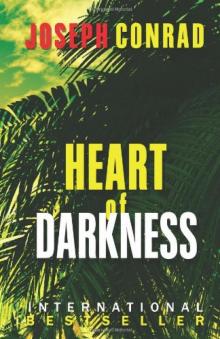 Heart of Darkness
Heart of Darkness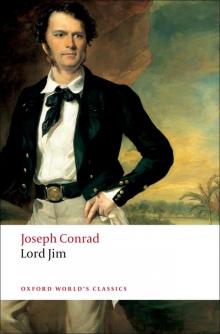 Lord Jim
Lord Jim The Nigger of the Narcissus (Echo Library)
The Nigger of the Narcissus (Echo Library) Victory (Dover Thrift Editions)
Victory (Dover Thrift Editions) Secret Agent
Secret Agent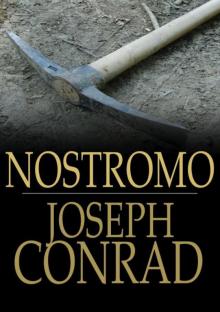 Nostromo
Nostromo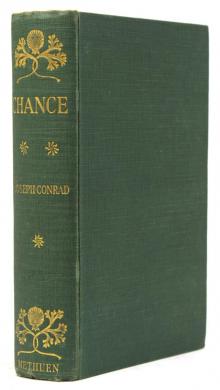 Chance: A Tale in Two Parts
Chance: A Tale in Two Parts Youth
Youth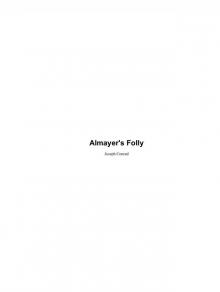 Almayer's Folly
Almayer's Folly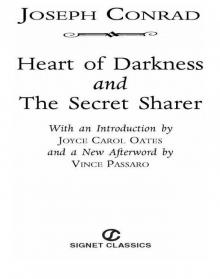 The Heart of Darkness and the Secret Sharer
The Heart of Darkness and the Secret Sharer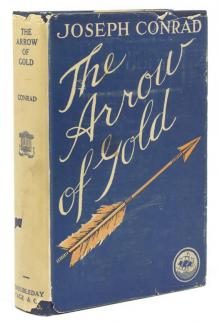 The Arrow of Gold: A Story Between Two Notes
The Arrow of Gold: A Story Between Two Notes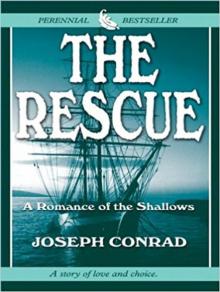 The Rescue: A Romance of the Shallows
The Rescue: A Romance of the Shallows The Point Of Honor: A Military Tale
The Point Of Honor: A Military Tale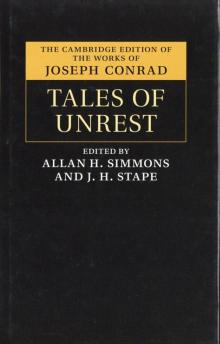 Tales of Unrest
Tales of Unrest Under Western Eyes
Under Western Eyes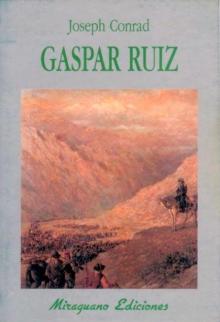 Gaspar Ruiz
Gaspar Ruiz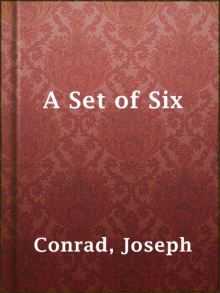 A Set of Six
A Set of Six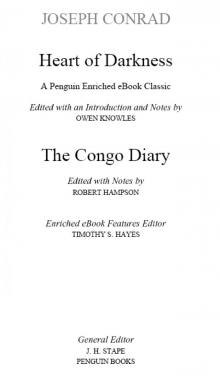 Heart of Darkness and the Congo Diary (Penguin Classics)
Heart of Darkness and the Congo Diary (Penguin Classics)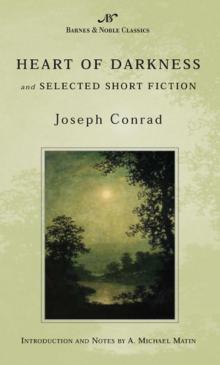 Heart of Darkness and Selected Short Fiction
Heart of Darkness and Selected Short Fiction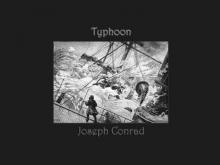 Typhoon
Typhoon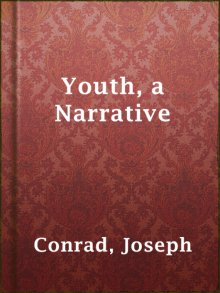 Youth, a Narrative
Youth, a Narrative Tomorrow
Tomorrow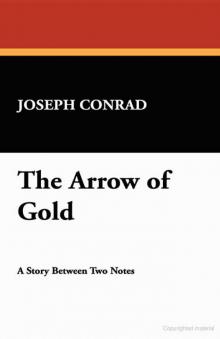 The Arrow of Gold
The Arrow of Gold The Shadow Line: A Confession
The Shadow Line: A Confession The Rescue
The Rescue Victory (Echo Library)
Victory (Echo Library) The Brute
The Brute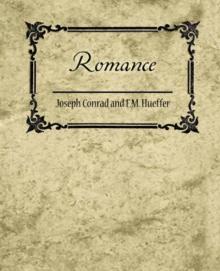 Romance
Romance A Personal Record
A Personal Record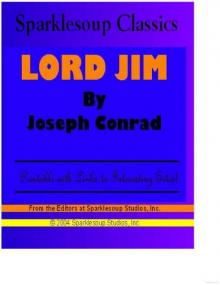 Lord Jim: A Tale
Lord Jim: A Tale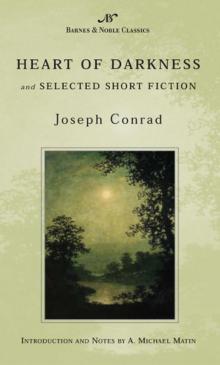 Heart of Darkness and Selected Short Fiction (Barnes & Noble Classics Series)
Heart of Darkness and Selected Short Fiction (Barnes & Noble Classics Series) Within the Tides
Within the Tides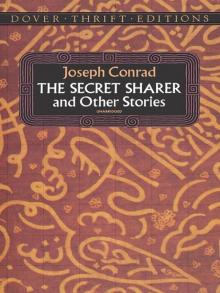 The Secret Sharer and Other Stories
The Secret Sharer and Other Stories Falk
Falk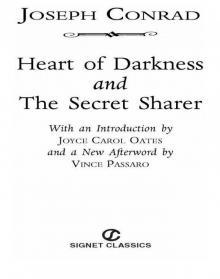 Heart of Darkness and The Secret Sharer
Heart of Darkness and The Secret Sharer Chance
Chance An Anarchist
An Anarchist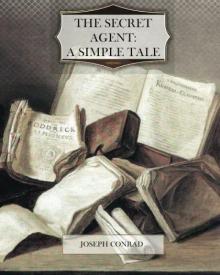 The Secret Agent: A Simple Tale
The Secret Agent: A Simple Tale The Secret Agent
The Secret Agent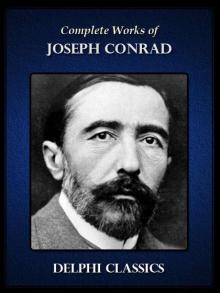 Complete Works of Joseph Conrad (Illustrated)
Complete Works of Joseph Conrad (Illustrated)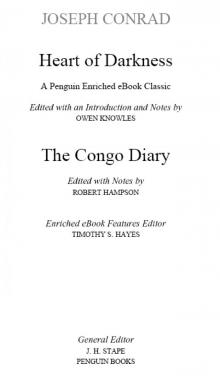 Heart of Darkness and the Congo Diary
Heart of Darkness and the Congo Diary Notes on Life & Letters
Notes on Life & Letters Typhoon (Single Story)
Typhoon (Single Story)